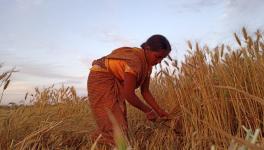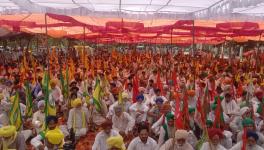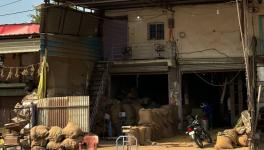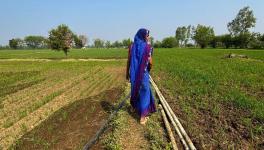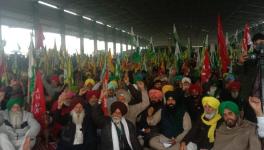Farm Laws: How Punjab is Organising to Keep Protests Alive During Harvesting Season
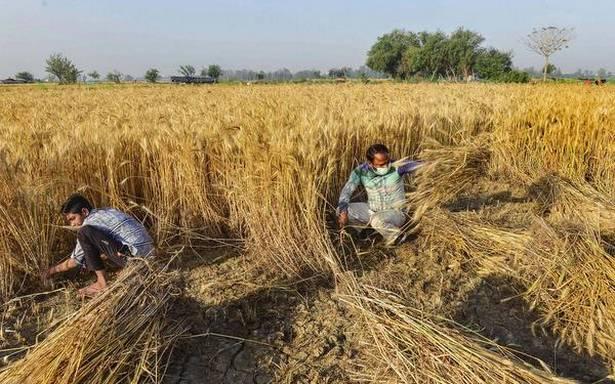
Representational Image. Image Courtesy: Business Line
With the harvesting season barely days away, preparations in Bathinda district's Chak Fateh Singhwala village are on in full swing. Jaswinder Singh, 45, will be harvesting 10 acres of his yield of wheat in a week's time. Singh, who returned to his village two days ago from the Delhi border will be helped by his friend and two men from the neighbourhood.
Nearly each year, Singh and his father, 65-year-old Jagrat Singh, would harvest the fields. However, the situation is a bit different this time around. Singh is alone, as his father is at the Delhi border protesting against the three contentious Farm Laws.
Singh believes working and protesting should go hand-in-hand. “The day I came back to Punjab, my father left for the border. Both, the farm produce and the agitation at the borders, are essential for our survival. We can’t let go of one for another,” he added.
With harvesting season setting in and a sizeable population of farmers protesting, Punjab is showing the way on how to keep an agitation alive and get work done too.
The logistics required for harvesting will be shared among the farmers. “It is primarily machine work. A combine harvester is the key equipment required for harvesting. Aside from that many tractor-trolleys are at the borders. Few have been brought back. So the tractor-trolleys will be shared among villagers depending on who is harvesting on that day,” said Singh.
A combine harvester is essential during the harvesting period as it enables the reaping of yield in one go and requires lesser labour.
According to Singh, the fields of those who are protesting at Delhi's borders will be harvested first. Meetings have been held in every gaali (neighbourhood) on how this will be coordinated and the logistics required.
“The plan will ensure that nobody suffers losses. So, meetings are being held at the neighbourhood level. Everyone has come out in support,” he added.
Veer Devinder Singh, who resides in the same village, has been helping the families who have been at the borders. He said that the number of protesters at Delhi's borders should not be allowed to dwindle.
A meeting was organised by the farmers' unions few days ago where a plan was fleshed out. “The harvesting depends on when the crop was sown back in November and December – when the crop will mature. So it will vary, which will help us in deciding when and where one needs to be available,” he added.
Besides neighbourhood-level meetings, village-level and district-level plans have also been drawn out. A three-tier system of neighbourhood, village and district has been created to cover all the protesting farmers' families and ensure that no one faces a loss. Farmers told Newsclick that people are leaving for Delhi's borders in batches based on harvesting time. “A batch leaves from one district for home, a batch from another district arrives. So, the farmers are coming and leaving district-wise, also to step up the process of harvesting,” said Devinder.
The general consensus among the farmers is that the government intended to show that the movement was dying out during the wheat harvesting season. “The government has been waiting for the wheat harvesting season so that the crowds at the borders reduce, which it will use to further its agenda that the movement has died. We were aware of this and hence proper planning has been done to keep the agitation going,” said another villager, Gurvinder Singh.
Punjab produced about 17.5 million tonnes of wheat last year, with the number expected to touch about 18 million tonnes this year.
To keep the movement alive, a series of village-level meetings were held last month. A team has been created which will carry the produce from the protesting farmers' families to mandis. In case help is needed with the harvesting, the members from the team will see to it. The team consists of workers, local farmers, and volunteers in support of the agitating farmers.
“The team was created to help the protesting farmers' families back in Punjab. The team will help with logistics, harvesting and essentially, with carrying the produce to mandis. The struggle is long. We are prepared for it,” said Devinder.
Get the latest reports & analysis with people's perspective on Protests, movements & deep analytical videos, discussions of the current affairs in your Telegram app. Subscribe to NewsClick's Telegram channel & get Real-Time updates on stories, as they get published on our website.











